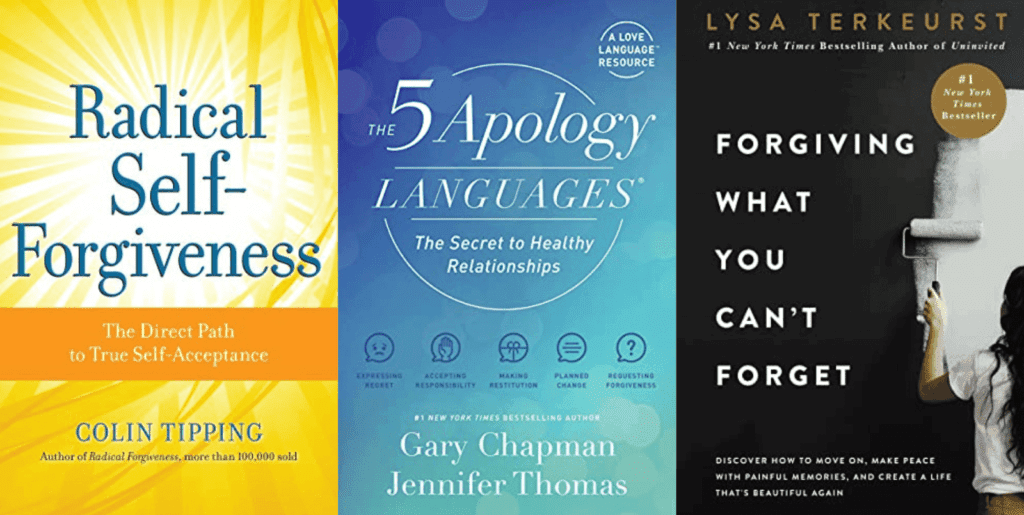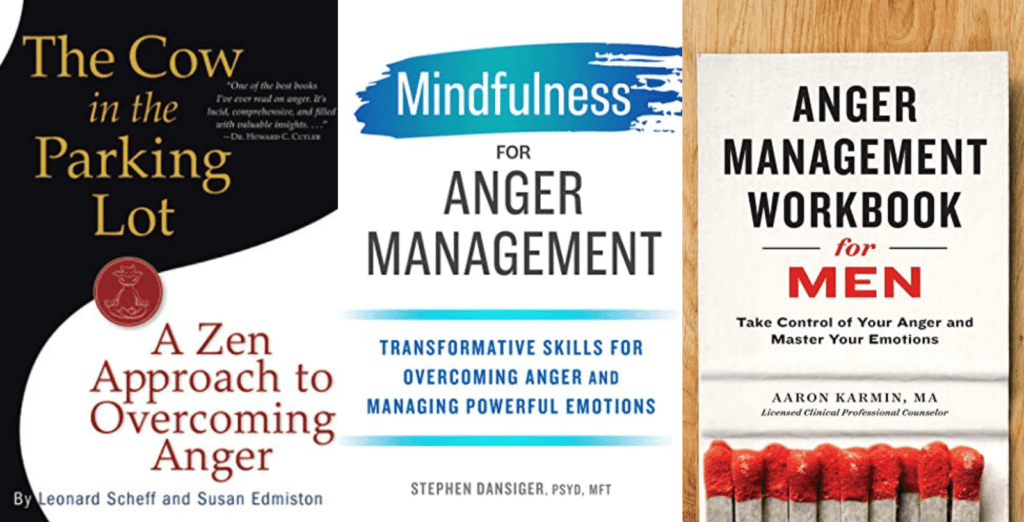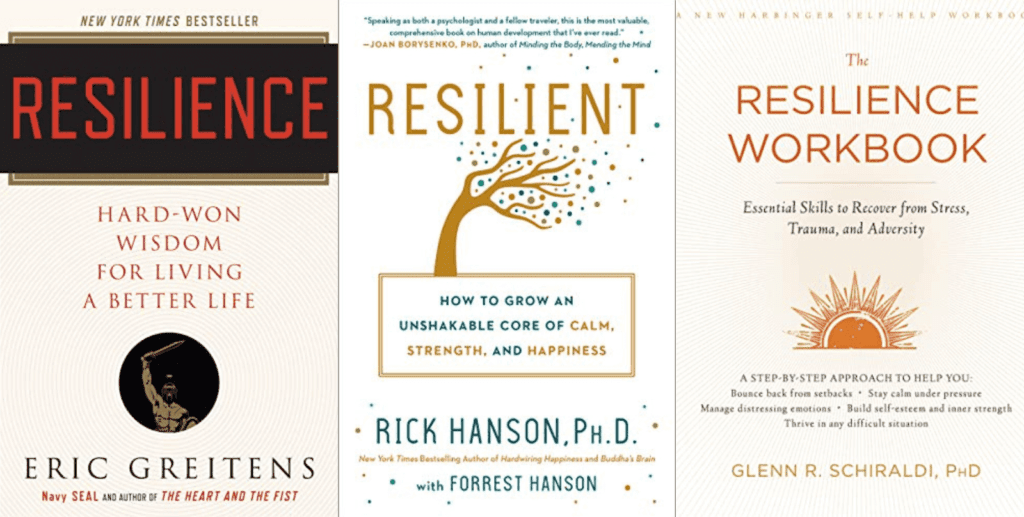The following are some of the best forgiveness books to help you on your recovery journey.
Disclosure: Some of the links below are affiliate links. This means that, at zero cost to you, I will earn an affiliate commission if you click through the link and finalize a purchase.
What Is Forgiveness?
Forgiveness is a psychological and emotional process that involves letting go of feelings of anger, resentment, or revenge towards someone who has harmed you.
It is a choice to release negative emotions and the desire for retaliation, and instead, cultivate compassion, understanding, and empathy towards the offender.
Holding onto grudges or harboring resentment can lead to chronic stress, anxiety, and even physical health issues.
Forgiveness helps to reduce these negative emotions and their associated physiological responses, promoting better overall well-being.
Forgiveness allows individuals to reclaim their power and autonomy.
It is an act of self-empowerment, demonstrating that you are no longer defined by the actions of the offender and are choosing to prioritize your own healing and growth.
It’s important to note that forgiveness is a personal choice, and the process may vary from person to person. It can take time, effort, and self-reflection.
Related: Best 7 Books On Detachment
What Forgiveness Is Not
Forgiveness is not excusing or justifying the behavior: Forgiving someone does not mean you are condoning or accepting what they did. It doesn’t imply that the offense was insignificant or should be forgotten. Forgiveness is about finding peace within yourself, regardless of the actions of others.
Forgiveness is not forgetting: Forgiveness does not require you to erase the memory of the offense or pretend it never happened. It’s natural to remember past hurts and learn from them. The goal is to release the emotional burden associated with the offense, rather than erasing the memory itself.
Forgiveness is not automatically reconciling or rebuilding trust: While forgiveness can be an essential step in the healing process, it doesn’t guarantee reconciliation or a restoration of trust in the relationship. Rebuilding trust is a separate process that depends on various factors, including the offender’s willingness to change and make amends.
Forgiveness is not a one-time event: Forgiveness is often a journey rather than a single event. It may involve ups and downs, moments of progress, and moments of regression. It’s normal to experience conflicting emotions and setbacks along the way. Patience and self-compassion are vital throughout this ongoing process.
Related: Rational Detachment – What Is It and How to Cultivate it
Best Forgiveness Books

1. Forgiving What You Can’t Forget
By Lysa TerKeurst
With deep empathy, therapeutic insight, and rich Bible teaching coming out of more than 1,000 hours of theological study, Lysa will help you:
- Learn how to move on when the other person refuses to change and never says they’re sorry.
- Walk through a step-by-step process to free yourself from the hurt of your past and feel less offended today.
- Discover what the Bible really says about forgiveness and the peace that comes from living it out right now.
- Identify what’s stealing trust and vulnerability from your relationships so you can believe there is still good ahead.
- Disempower the triggers hijacking your emotions by embracing the two necessary parts of forgiveness.

2. The Gift of Forgiveness
By Katherine Schwarzenegger Pratt
Here, Katherine Schwarzenegger Pratt shows us what we can learn from those who have struggled with forgiveness, some still struggling, and others who have been able to forgive what might seem truly unforgivable.
The Gift of Forgiveness is a perfect blend of personal insights, powerful quotations, and hard-won wisdom for those seeking a way to live with greater acceptance, grace, and peace.
Related: Forgiving Someone Who Isn’t Sorry: 9-Step Guide To Free Yourself From The Past

3. Radical Forgiveness
By Colin Tipping
Topics covered include:
• How to transform difficult emotions like anger, fear, and shame into unconditional love, gratitude, and peace
• The five essential stages of Radical Forgiveness, and how they help us transcend the victim archetype and embrace the inherent perfection of life
• The Radical Forgiveness Worksheet―an effective and easy-to-use tool for tapping into your “spiritual intelligence” to resolve grievances
“Radical Forgiveness is much more than the mere letting go of the past,” writes Colin. “It is the key to creating the life that we want and the world that we want.” With Radical Forgiveness, he puts that key in our hands.
Related: Best 21 Forgiveness Journal Prompts (+FREE Worksheets PDF)

4. Forgiveness: 21 Days to Forgive Everyone for Everything
By Iyanla Vanzant
With Iyanla’s 21-Day Forgiveness Plan, you’ll explore relationship dynamics with your parents, children, friends, partners, co-workers, bosses, yourself, and even God. With journaling work and Emotional Freedom Techniques (also known as “tapping”), you’ll learn to live with more love; gain new clarity on your life, lessons, and blessings; and discover a new level of personal freedom, peace, and well-being. Forgiveness doesn’t mean agreeing with, condoning, or even liking what has happened.
Related: Listen to Your Inner Guidance: A Beginner’s Guide To Meditation

5. The 5 Apology Languages
By Gary Chapman, Jennifer Thomas
In The 5 Apology Languages, Gary Chapman, the #1 New York Times bestselling author of the 5 Love Languages®, partners with Jennifer Thomas to help you on the journey toward restored relationships. True healing comes when you learn to:
- Express regret: “I’m sorry.”
- Accept responsibility: “I was wrong.”
- Make restitution: “How can I make it right?”
- Plan for change: “I’ll take steps to prevent a reoccurrence.”
- Request forgiveness: “Can you find it in your heart to . . . ?”
Related: Best 9 Nonfiction Books About Mental Health

6. Radical Self-Forgiveness
By Colin Tipping
Based on his world-renowned forgiveness workshops, the Radical Self-Forgiveness shares clear insights for resolving our deepest internal wounds using Tipping’s five-stage forgiveness process.
Related: How To Make Peace With Your Past Mistakes Today and Never Repeat Them?

7. The Forgiveness Workbook
By Ilene S. Cohen PhD
Go deeper than other personal growth books with:
- Six steps to moving on—Find a road map of what to expect along the journey, with chapters that clearly break down the six stages of forgiveness.
- Focus on self-empowerment—Learn how a willingness to forgive helps build resilience, healthier relationships, and a stronger sense of self.
- The science of forgiveness—Understand what happens in the brain and body when you hold in negative feelings—and the benefits of leaving them behind.
Related: Best Edith Eger Quotes (“The Gift”): 12 Invaluable Lessons to Set Yourself Free

8. The Forgiveness Journal
By Lysa TerKeurst
In this unique companion resource to her #1 New York Times Bestseller Forgiving What You Can’t Forget, Lysa shares:
- Honest reflections where she wrestles with forgiving those who hurt her the most
- Powerful readings about forgiveness and healing
- Encouraging quotes from Forgiving What You Can’t Forget
- Key Bible verses related to the topic of each chapter
- Journaling prompts for personal processing, along with space to write
- Short prayers to get you started in giving your hurt over to God
Related: Best 10 Tips On How To Stop Envying Others
9. Forgiveness Is a Choice
By Dr. Robert D. Enright PhD
This groundbreaking work demonstrates how forgiveness, approached in the correct manner, benefits the forgiver far more than the forgiven. Filled with wisdom and warm encouragement, the book leads the reader on a path that will bring clarity and peace.

10. Forgive for Good
By Frederic Luskin
Based on scientific research, this groundbreaking study from the frontiers of psychology and medicine offers startling new insight into the healing powers and medical benefits of forgiveness. Through vivid examples (including his work with victims from both sides of Northern Ireland’s civil war), Dr. Fred Luskin offers a proven nine-step forgiveness method that makes it possible to move beyond being a victim to a life of improved health and contentment.

11. Forgive: Why Should I and How Can I?
By Timothy Keller
Pastor and New York Times bestselling author Timothy Keller outlines the reasons why forgiveness has to be a central part of everyone’s lives.
Forgiving anyone in a meaningful way is one of the hardest things a person has to do. If you do not, resentment and vengeance begin to consume you. It is nearly impossible to move past transgression without forgiveness, but few people have the resources and the tools to forgive others fully and move on with their lives. Forgiveness is an essential skill, a moral imperative, and a religious belief that cuts right to the core of what it means to be human. In Forgive, Timothy Keller shows readers why it is so important and how to do it, explaining in detail the steps you need to take in order to move on without sacrificing justice or your humanity.

12. Forgiveness: Finding Peace Through Letting Go
By Adam Hamilton
In the passionate and life-changing book Forgiveness: Finding Peace Though Letting Go, bestselling author Adam Hamilton brings the same insight that he applied in the bestseller “Why?” to the challenge of forgiveness. Hamilton argues that revelation comes when we realize that forgiveness is a gift we give ourselves rather than to someone else. He also contends that only when we learn to forgive others and ourselves can we truly receive forgiveness from God.
FREE Forgiveness Worksheets PDF
How Forgiveness Books Can Help?
Here’s how forgiveness books can help:
1. Understanding the concept
Forgiveness books often explore the meaning and significance of forgiveness, helping readers gain a deeper understanding of what forgiveness entails.
They may provide insights into the psychological, emotional, and relational aspects of forgiveness and offer different perspectives on its importance.
2. Shifting perspectives
These books can challenge existing beliefs and attitudes towards forgiveness, encouraging readers to consider alternative viewpoints.
They provide stories, case studies, or examples that illustrate the transformative power of forgiveness, allowing readers to see forgiveness in a new light.
3. Emotional healing
Forgiveness books often address the emotional wounds caused by betrayal, hurt, or trauma.
They provide techniques, exercises, or strategies to help individuals process their emotions, release anger or resentment, and move towards emotional healing.
By offering practical guidance, these books can empower readers to take steps towards personal growth and inner peace.
Related: Assertive Anger: What It Is & How to Practice It
4. Building empathy and compassion
Many forgiveness books emphasize the importance of empathy and compassion towards oneself and others.
By exploring the experiences and motivations of both the forgiver and the offender, these books foster a deeper understanding of human nature and promote a sense of empathy and compassion, which can be integral to the forgiveness process.
5. Practical tools and exercises
Forgiveness books often provide practical tools, exercises, or journaling prompts that individuals can use to facilitate their forgiveness journey.
They may introduce various forgiveness techniques, such as writing forgiveness letters, practicing mindfulness, or engaging in cognitive reframing.
These activities can help individuals navigate their emotions, develop empathy, and work towards forgiveness in a structured and tangible way.
Related: Top 7-Day Acceptance Challenge For A Peaceful Life
6. Support and validation
Reading forgiveness books can provide a sense of support and validation for individuals struggling with forgiveness.
It allows them to realize that they are not alone in their experiences and that their feelings are valid.
This validation can offer comfort and encouragement, motivating individuals to continue on their path towards forgiveness.
Related: How To Live A Peaceful Life? 101 Timeless Principles to Find Peace Within Yourself
Conclusion
Forgiveness is a complex and challenging process that can greatly benefit one’s emotional well-being.
Forgiveness books, also known as self-help or therapeutic books on forgiveness, offer valuable insights, guidance, and tools to aid individuals in their journey towards forgiveness.
Remember, forgiveness is a personal journey, and not all forgiveness books may resonate with everyone.
It’s important to find resources that align with your values, beliefs, and specific circumstances.




